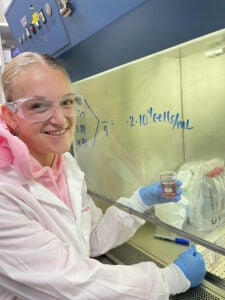
Jocelyn Stephens is a chemistry major in her senior year at Boise State University. Throughout the summer, she began working with biochemistry Professor Ken Cornell, researching microbes and plasma devices, as part of her Ralph Jones Fellowship.
Read on to learn about her experience!
What kind of project are you working on with Dr. Cornell?
All of the projects I worked on focused on elimination of microbes/pathogens using cold-atmospheric pressure plasma (CAP) on different substrates. I had two main projects that I focused on during the summer. The first was looking at inactivating pathogens on plant seeds to show the effectiveness of using CAP in an agricultural setting.
The main goal of our research on this project is to show that using CAP can increase seed viability and germination rates. Pathogens and microbes found on seeds can negatively impact seed germination rates as well as increase the rate of food borne illness. Treatment of infected seeds by CAP was shown to kill 99% of the pathogen of interest within 10 minutes.
The focus of the second project I worked on was investigating the use of a plasma device that sweeps across surfaces. Our research lab works closely with Dr. Jim Browning’s engineering lab, so my main job was to be the bridge between our lab and the engineering lab and provide support to the engineering team as they worked on the new device.
What is the main role you have been given as a fellow in Dr. Cornell’s lab?
I am a project lead working on implementing the use of a sweeping plasma device as well as a research assistant working on the team focused on plant seeds.
What interests you most about this research?
I find the work we did with foodborne illness to be very interesting. I have heard about many different instances of widespread foodborne illness from restaurants as well as food poisoning that occurs in individual’s lives. It is exciting to me that the work we do could have a direct impact on reducing illness within the population.
Within my other project I enjoy being a team lead and getting to collaborate with people in my lab as well as in the engineering lab we work with. Learning how to coordinate the efforts of many different people and support individuals within a team has been a rewarding experience for me as both a person and a leader.
When did you first know you wanted to study health and medicine?
I have always been interested in science but only recently narrowed that down to medicine specifically. I originally wanted to follow in my mother’s footsteps and work in the pharmaceutical industry with a focus on oncology. As I continued through my college career and took a variety of different classes, I realized I wanted a more patient-focused career.
Medicine offers me the opportunity to work with patients every day and to continue to learn about science throughout my whole life. I wouldn’t say I ever had that “aha” moment that some people talk about, but it was more of a slow shaping that I wanted a career in medicine, I wanted something where I was directly working with patients and I wanted something broad enough that I could still have freedom to choose what I wanted to do with my career.
What are some of the skills you learned throughout this research experience that you’re excited to take into a future career?
One of the big ones is effectively communicating with people from all different backgrounds. As a part of a team and especially a team leader communication is critical to effectiveness and success. I learned how to communicate through email, to communicate within group settings and to communicate with people from different backgrounds.
Another skill that I learned is the task of delegation. Learning to teach others how to do things and then give them the space to accomplish tasks on their own allowed me to focus on my own tasks and made my team more effective.
What advice would you give to other students thinking about applying to the Ralph Jones Fellowship?
I would encourage everyone to do it! The connections I made with people in my lab, with my primary investigator and with the other Ralph Jones fellows are worth it in themselves. Apart from getting to work on some really cool projects and learn more about microbial science I got to meet new people, learn about their projects, and practice presenting a poster at ICUR. One thing that I think is important if you do a fellowship, and with everything in life, is to give it your all.
Has working on this research project changed your view of the medical field in any way?
It is easy to think about medicine or health care and only think about doctors. The reality is that there are so many aspects of medicine and health care and loads of people who support doctors. Without everyone working toward a common goal medicine would not be complete in the way we know it today. This project showed me a different aspect of medicine that I had not been exposed to before.
What was your favorite takeaway from this fellowship?
My favorite take-away is the relationships I built with people in my lab. I have lots of memories both in the lab solving problems and out of the lab going for coffee runs, having lunch together and sharing laughs during our lab meetings.
Learn more about the Ralph Jones Pre-Medical Summer Research Fellowship.